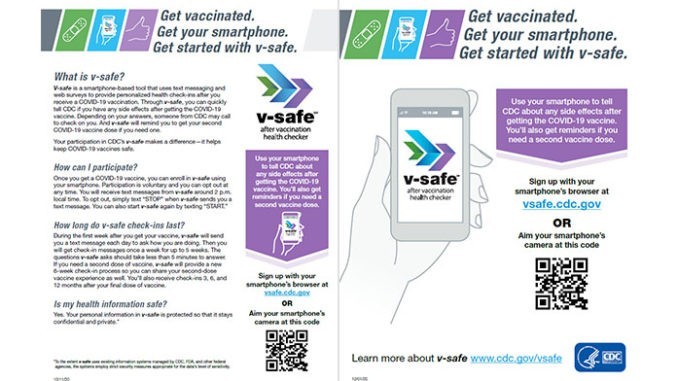
On Tuesday, the Biden Administration stated it is not involved in nor supports the development of “vaccine passports,” while at the same time the Centers for Disease Control and Prevention (CDC) is encouraging vaccine providers to push people to share their personal health and vaccination data through their smartphones.
“The government is not now, nor will we be supporting a system that requires Americans to carry a credential,” Press Secretary Jen Psaki said this week. “There will be no federal vaccinations database and no federal mandate requiring everyone to obtain a single vaccination credential.”
However, some privacy advocates and civil rights attorneys contend v-safe, the CDC’s “after vaccination health checker” tool, is just such a federal COVID-19 database which collects a user’s name, information about which vaccine they receive and when, phone number, ethnicity, race, gender, age, and zip code. A unique registration number is then assigned and texted to the user.
Once someone inputs information about their vaccination, v-safe sets up a series of check-ins or surveys that will continue for 12 months after the last dose. Users can also report side effects and may even receive a call from the CDC depending on how the user answers a question.
The purpose, according to the CDC, is to collect data about how the vaccines are working in the real world, which could be invaluable in the future as doctors learn more about long-term effects of the officially non-FDA approved vaccines.
One question asked during the registration process is whether the v-safe user is pregnant. A post-vaccination positive pregnancy test can also be voluntarily reported via the tool, according to the CDC.
“If you report within v-safe that you were pregnant at the time of vaccination or had a positive pregnancy test after vaccination, you might receive a phone call requesting your participation in the v-safe COVID-19 Vaccine Pregnancy Registry,” the CDC website states. “Registry participants will be contacted for health check-ins several times throughout their pregnancy, as well as at the end of their pregnancy and when their baby is 3 months old.”
The CDC website also notes that participation in the pregnancy registry is important because it “helps monitor the safety of COVID-19 vaccines when administered during pregnancy.”
Participation in v-safe or the COVID-19 Vaccine Pregnancy Registry is voluntary, and a user can opt out at any time. However, because the tools are only available with a smartphone and neither program is available in Spanish, an estimated 60 million adult Americans are unable to register.
The Arizona Department of Health Services (ADHS) has created promotional flyers in an effort to push healthcare providers in encourage people to register with v-safe. Documents obtained by Arizona Daily Independent show ADHS even provides medical personnel with a script to use to promote v-safe.
It reads: “CDC has created a way for you to report how you feel after COVID-19 vaccination through a smartphone-based tool that uses text messaging and web surveys to check in with you. Here (or in your packet) is a v-safe information sheet with more details and simple instructions to sign up.”
Medical facilities and providers which already have some form of automatic patient notification system are also being asked by ADHS to add a notification to their system after a vaccination “to remind patients to participate in v-safe.”
The CDC says that a user’s personal information collected by v-safe “is protected so that it stays confidential and private.” The advisory also notes that the information systems managed by the CDC, the FDA, and “other federal agencies” for operating v-safe “employ strict security measures appropriate for the data’s level of sensitivity.”
The question, privacy advocates say, is whether all of that data will be used later on for verifying someone’s vaccination status, thus circumventing the need for a formal “vaccine passport” type of document.
[pdf id=213263]
